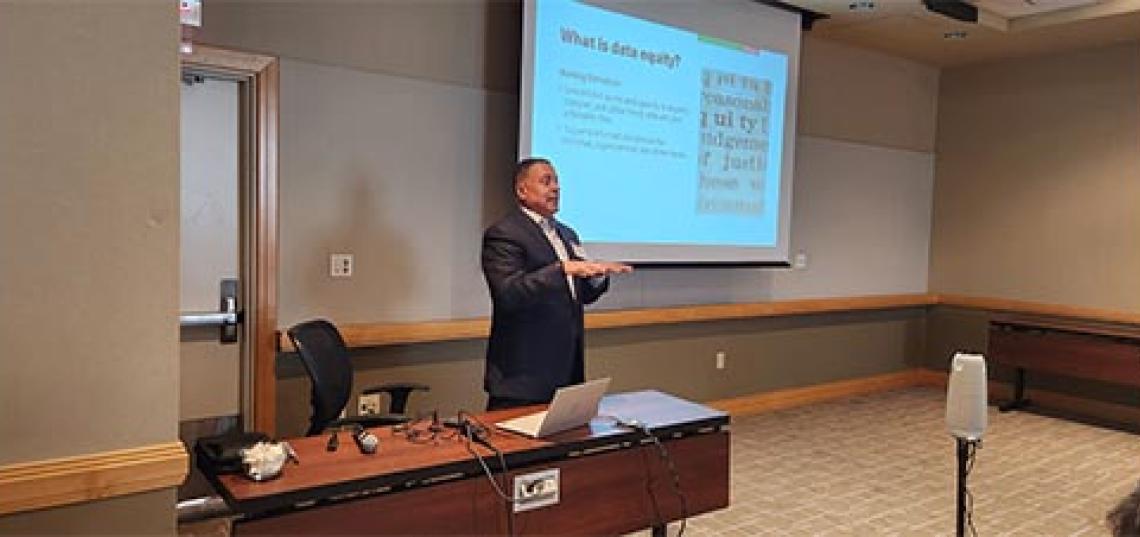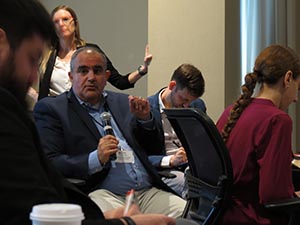
Public health leaders, researchers, community advocates, and funders convened in New Brunswick, New Jersey, on June 3-4, 2025, for the “Forum on Advancing the Science and Practice of Actionable Public Health Data Dashboards." The two-day event, sponsored by the Robert Wood Johnson Foundation and hosted at Rutgers University, aimed to establish a framework and research agenda to guide the design, implementation, assessment, and sustainability of public health data dashboards that not only present data but also genuinely drive evidence-informed decisions and promote health equity. The event was supported by several SC&I students and research assistants who have been involved with the project over the past year: Miriam Kim, Anna Kareeva, Adiva Khan, Justine Quow, and Natalia Herman.
“Timely access to relevant, comprehensive, accurate, and credible public health data is critical to supporting evidence-informed policy and practice decisions at all levels, and data dashboards are increasingly used for that purpose,” said SC&I Professor of Communication Itzhak Yanovitzky, who was one of the Forum’s co-organizers. “As dashboards are poised to become more integral to local, national, and international public health decisionmaking processes, it is imperative to proactively consider how they may be optimally designed, implemented, improved, and sustained to be actionable (i.e., both usable and useful).”
The Forum addressed critical gaps in current approaches to design and implementation, including a lack of systematic insights regarding collaborative design processes and the imperative to embed equity considerations throughout the dashboard design and implementation lifecycle.
From Data Access to Capacity-Building: The Evolving Landscape of Research and Public Investments
 Brian Quinn, Associate Vice President for Research, Evaluation, and Learning at the Robert Wood Johnson Foundation (RWJF), who opened the event, soke about the evolution of data tools, tracing RWJF's shift from simply disseminating information to engaging stakeholders in two-way relationships. He noted the foundation's significant investments in initiatives like the County Health Rankings and Congressional District Health Dashboard while acknowledging that these efforts haven't always been guided by robust scientific evidence regarding optimal design and effective implementation. Quinn emphasized the urgent need to integrate scientific understanding into dashboard development, particularly given current federal funding and data availability cutbacks, reaffirming RWJF's commitment to health equity and supporting research.
Brian Quinn, Associate Vice President for Research, Evaluation, and Learning at the Robert Wood Johnson Foundation (RWJF), who opened the event, soke about the evolution of data tools, tracing RWJF's shift from simply disseminating information to engaging stakeholders in two-way relationships. He noted the foundation's significant investments in initiatives like the County Health Rankings and Congressional District Health Dashboard while acknowledging that these efforts haven't always been guided by robust scientific evidence regarding optimal design and effective implementation. Quinn emphasized the urgent need to integrate scientific understanding into dashboard development, particularly given current federal funding and data availability cutbacks, reaffirming RWJF's commitment to health equity and supporting research.
The co-organizers of the Forum, Yanovitzky and Associate Professor of Library and Information Science Charles Senteio from Rutgers SC&I and Assistant Professor Gretchen Stahlman from Florida State University (and a former SC&I/LIS faculty member) offered an overview and critical reflections on the current state of research on actionable public health data dashboards based on a recent published scoping review of the literature on the topic and a research study that assessed the actionability of federal and state public health dashboards. They highlighted the lack of systematic approach in the research literature to design, implementation, and evaluation of actionable public health dashboards, and pointed to the absence of clear, evidence-based guidelines and standards regarding practice as a major impediment to realizing the full potential of dashboards to improve public health outcomes and advance health equity.
Yanovitzky advocated for a critical shift from data-centric to actionability-centered design of dashboards, conceiving them as tools for helping users to access and use data-based insights for successfully navigating complex decisions rather than as merely data dissemination tools. He suggested that existing frameworks and tools for designing adaptive interventions can be used to ground future efforts to design and implement actionable public health data dashboards.
Key takeaways underscored the immense value of interdisciplinary knowledge, the critical need for incentivized collaborations, and the pressing imperative for all stakeholders to proactively develop a robust public health data infrastructure that addresses logistical, financial, legal, and equity aspects.
Stahlman reflected the collaborative dimension of dashboard design and implementation, noting that despite good intentions, most dashboards are "creator-driven" with limited user participation beyond basic feedback. She stressed that effective collaboration must be integral to the design process, not an afterthought, and emphasized the need for more theoretically and methodologically rigorous research that tests effective structures, mechanisms, and conditions for optimizing collaboration processes.
Senteio closed by offering a critical perspective on centering equity in design and implementation of public health dashboards. He identified key "equity touchpoints" in the process of designing and implementing actionable dashboards, including data sourcing and curation, data analysis and interpretation, proactive mitigation of misinformation and other sources of bias, and data capacity building—each requiring intentional engagement with stakeholders and deliberate actions to address biases and ensure fair representation and access.
"The participants’ responses to the key equity touchpoints confirmed how urgent it is to embed equity touchpoints throughout dashboard design and implementation," Senteio said. "Building on that enthusiasm, we held meaningful discussions which demonstrated the potential to confront the gaps that remain and co-create new solutions.”
Designing Dashboards for Actionability and Impact
The Forum’s three panels took on the challenge of reimagining design and implementation of actionable dashboards. The first Panel, moderated by alumna Kate Magsamen-Conrad, Ph.D.'12 (Professor of Communication Studies at the University of Iowa) and a group of design experts, including SC&I alumna and a Postdoctoral Fellow in the Department of Family Medicine and Community Health at Rutgers Robert Wood Johnson Medical School, Sarah Fadem, considered the complexities of creating data tools that are both meaningful and accessible, particularly for under resourced populations. Panelists emphasized the necessity of co-design, involving end-users early through low-fidelity prototyping and iterative feedback, and linking sustainability to genuine community involvement; the value of clear communication, simplicity in visualization, customization, and user feedback loops; the value of adopting behavioral design principles to promote routine and informed use of dashboards; and the importance of building user and community trust, using culturally resonant language, and investing in training community members as data collaborators, advocating for true agency and ownership within partnerships.
 The second panel delved into the financial realities of developing and maintaining public health dashboards. Panelists reflected on their experience with designing and implementing dashboards within an academic setting, highlighting universities' in-kind support and the critical role of external partnerships for relevance and scalability. They also stressed the importance of involving business, legal, and clinical stakeholders and provided a concrete example of integrating dashboards with value-based care models, where cost savings from data-driven interventions could fund dashboard maintenance. Turning to a policy and funding perspective, panelists reminded attendees of federal agencies' obligation to produce public data and noted that typical federal grants are short-term, necessitating alternative sustainability plans, including establishing data consortia and collaborative or multi-sponsor funding portfolios. The panel emphasized diverse revenue streams, balancing open access with commercial models, and demonstrating value to stakeholders.
The second panel delved into the financial realities of developing and maintaining public health dashboards. Panelists reflected on their experience with designing and implementing dashboards within an academic setting, highlighting universities' in-kind support and the critical role of external partnerships for relevance and scalability. They also stressed the importance of involving business, legal, and clinical stakeholders and provided a concrete example of integrating dashboards with value-based care models, where cost savings from data-driven interventions could fund dashboard maintenance. Turning to a policy and funding perspective, panelists reminded attendees of federal agencies' obligation to produce public data and noted that typical federal grants are short-term, necessitating alternative sustainability plans, including establishing data consortia and collaborative or multi-sponsor funding portfolios. The panel emphasized diverse revenue streams, balancing open access with commercial models, and demonstrating value to stakeholders.
Participants in the third panel highlighted several critical dimensions for developing and sustaining actionable data dashboards, emphasizing the interconnected roles of data infrastructure, collaboration, power dynamics, and funding. They underscored the complexity of data ecosystems and the necessity of consulting and educating communities to foster meaningful participation and agency in dashboard design, while cautioning against superficial or tokenistic engagement. The discussion addressed power imbalances inherent in data initiatives, advocating for grassroots, bottom-up approaches to redistribute influence and ensure infrastructure reflects community values and governance.
The importance of making invisible infrastructures—such as collaborative networks, advisory groups, and data intermediaries—visible and supported was repeatedly emphasized, along with strategies to build resilience through relationship-building, redundancy, documentation, and sustained user engagement.
The forum concluded with a shared understanding that advancing public health data dashboards requires a holistic, multi-faceted approach.
Funders’ roles in fostering equitable partnerships, supporting data literacy, and addressing workforce retention challenges were recognized as vital.
Furthermore, the panel acknowledged structural and staffing challenges within federal data agencies, noting these as both obstacles and potential catalysts for modernization, with calls for transparency, clear communication about data provenance, and leveraging cross-sector collaboration and data storytelling to enhance data quality and trust.
A Roadmap for the Future
The forum concluded with a shared understanding that advancing public health data dashboards requires a holistic, multi-faceted approach. Key takeaways underscored the immense value of interdisciplinary knowledge, the critical need for incentivized collaborations, and the pressing imperative for all stakeholders to proactively develop a robust public health data infrastructure that addresses logistical, financial, legal, and equity aspects.
“This convening was an important step towards establishing a knowledge network of stakeholders and developers working to create innovative, actionable, and representative dashboards that nurture public health,” commented Stahlman. “We are tremendously grateful to our program officers and the Robert Wood Johnson Foundation for supporting our work and this event and look forward to continuing the momentum we all built together at the forum.” The path forward involves not just designing better dashboards, but fostering an ecosystem of collaboration, trust, and shared ownership that empowers diverse communities to leverage data for a more equitable and healthier future.
More details about the Forum and insights generated are available from the published proceedings.
Learn more about the Communication Department and the Library and Information Science Department at the Rutgers School of Communication and Information on the website.
